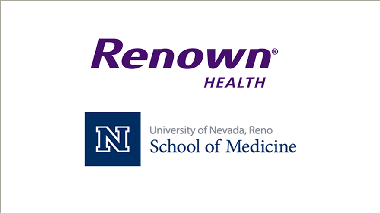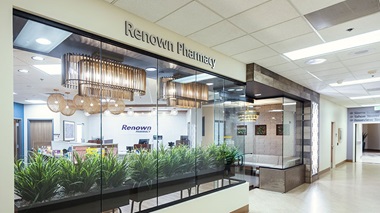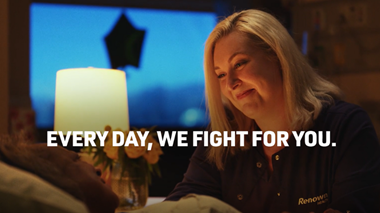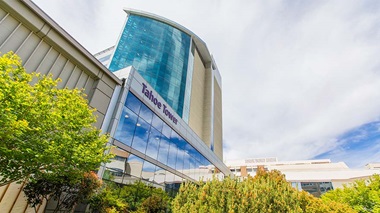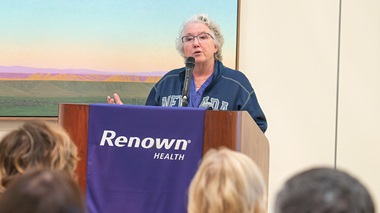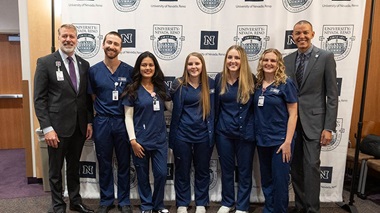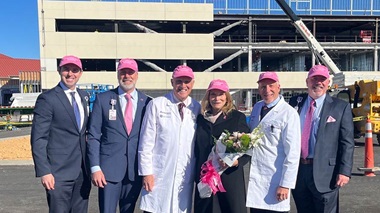Featured News
Careers
Awards & Accreditations
University of Nevada, Reno
Renown Health Foundation
Media Resources

Renown Health's public relations team supports media partners in finding experts on diverse health care topics. In addition, we provide information and answer all questions regarding Renown. We look forward to working with you.
-
Media On Campus
For patient confidentiality purposes, Renown Health policies require media to be escorted by the public relations staff at all times.
PR staff will gladly make parking arrangements, notify the appropriate hospital staff and help you find your destination.
Stand Ups/Live Broadcasts
Media may conduct stand ups and live broadcasts on our campuses. In the interest of patient confidentiality and traffic flow, a staff member will help you find the best location for your story.
We ask you to respect our obligation to protect our patients' well-being and legal right to privacy.
-
Patient Condition Inquiry
We follow regulations of the Health Insurance Portability and Accountability Act of 1996 (HIPAA) for all patients, including patients of public interest. HIPAA regulations specify which information may and may not be released without authorization from a patient.
Patient privacy regulations allow us to only share patient condition information about patients that appear in our directory.
Media inquiries require correct spelling of the patient's first and last name.
Definitions of "Condition" used by Renown Health
When describing a patient's condition, we can only release the following patient statuses:
Good - Vital signs such as pulse, temperature and blood pressure are stable and within normal limits. Patient is conscious, comfortable and there are no complications.
Fair - Vital signs are stable and within normal limits. Patient is conscious and alert although may be uncomfortable or in pain and may have minor complications.
Serious - Vital signs may be unstable or outside normal limits. The patient is acutely ill or injured and may have major complications.
Critical - Vital signs are unstable or outside normal limits. There are major complications.
Note: "Stable" is not a condition.
Press Releases
-
Renown Health Further Expands Visitor Policy to Two Loved Ones
Always listening to the voice of the patient, Renown Health is pleased to welcome any two patient supporters to visit their loved ones during their Renown medical visit, surgery, birthing or hospital stay. Renown continues to have extra safety measures in place to protect the health of patients, visitors and healthcare employees, and as the situation changes with COVID-19, these guidelines are subject to change. Under this updated visitor policy, patients no longer need to identify their supporters ahead of their arrival. Patients may receive more than two visitors per day; however, to help ensure adequate physical distancing, only two guests are asked to visit at a time. All people entering Renown sites must continue bringing and wearing a face mask for their entire visit, including inside patient rooms. Renown’s visitor policy updates were inspired by family members, who requested that the policy be expanded to encourage two family members per day to be able to visit a loved one who was hospitalized at Renown. The request was approved by Dr. Debra Adornetto-Garcia, Chief Nursing Officer and Dr. Paul Sierzenski, Chief Medical Officer, both of Acute Services. With a high percentage of Renown hospital staff now vaccinated against COVID-19, declining hospitalizations of patients with COVID-19, and understanding that the best communication is in-person, as of April 28, 2021, Renown hospitals and medical practices now allow two visitors, instead of one, for all patients and have put extra safety measures in place to protect patients, visitors and healthcare employees. “We are pleased to expand our visitor policy and welcome two healthy adult patient supporters to accompany every patient to their Renown medical visit or hospital stay,” said Tony Slonim, MD, DrPH, President & CEO of Renown. “We are always looking to our patients’ lived experiences to help us address the health needs of our community. Just a few months ago, we were reminded by Darlene Randolph that the best care is ‘person-centered care’, which inspired us to be one of the first healthcare organizations in the nation to expand our visitor policy to all patients, including those with COVID-19. Today, we thank our patients’ family members for voicing the importance of a larger, connected support system to help foster the best healing environment for all patients.” “At Renown, the definition of ‘family’ is defined by the patient,” said Debra Adornetto-Garcia, DNP, RN, NEA-BC, AOCN, Chief Nursing Officer, Acute Services. “Our patients may have anyone they choose as their patient supporters, and these individuals serve as an invaluable extension of our care teams. Patient supporters are asked to partner with the patient’s healthcare team to assist in communicating to other family members and friends, participating in training and education activities and assisting the patient with complying with care and medication instructions.” “Visiting the hospital can be an anxious experience,” said Paul Sierzenski, MD, MSHQS, CPE, FACEP, Chief Medical Officer, Acute Services. “It’s incredible how the company of loved ones can reduce anxiety and promote healing. What we can do together with families to support patient care and excellent outcomes is greater than what any of us can do alone. We are glad to welcome patient supporters to our hospitals to help our patients feel more at ease, so they can focus on their recovery, health and healing.” Two patient supporters per patient are now able to access Renown campuses as noted: Renown Regional Medical Center and Renown South Meadows Medical Center: 8 a.m. to 8 p.m. For Intensive Care Units (ICU): 9 a.m. to 8 p.m. Visitors must be at least 12 years of age or older. Renown Children’s Hospital: Open access. For the Pediatric unit and Pediatric Intensive Care Unit (PICU): Visitors must be at least 12 years of age or older. For the Neonatal Intensive Care Unit (NICU): Visitors must be at least 18 years of age or older. Renown Rehabilitation Hospital: 8 a.m. to 5 p.m. One designated patient supporter is allowed to visit the patient inside their room throughout the duration of their stay. Other loved ones may visit from an exterior window, outside the patient's room. Our care team is also pleased to facilitate bedside virtual visits. In addition to in-person visits, there are many ways to brighten the day of a patient at Renown Hospitals. You can send a personalized message that will be hand-delivered to your loved one, call 775-982-4100 to speak with a patient, or our care team is pleased to facilitate virtual visits via computer or tablet from the bedside. Renown Health reserves the right to limit visitors in the best interests of patients, families, visitors or staff. About Renown Health Renown Health is Nevada’s largest, locally governed, not-for-profit integrated healthcare network serving Nevada, Lake Tahoe and northeast California. With a diverse workforce of more than 6,500 employees, Renown has fostered a longstanding culture of excellence, determination and innovation. The organization comprises a trauma center, two acute care hospitals, a children’s hospital, a rehabilitation hospital, a medical group and urgent care network, and the locally owned not-for-profit insurance company, Hometown Health. Renown is currently enrolling participants in a community-based genetic population health study, the Healthy Nevada Project®.
Read More About Renown Health Further Expands Visitor Policy to Two Loved Ones
-
Awareness Saves Lives: Renown Goes Blue for Colorectal Cancer Awareness Month
After a year of possibly delayed colorectal cancer screenings due to theCOVID-19 pandemic, it’s more important than ever to raise awareness for colorectal cancer. March is National Colorectal Cancer Awareness Month- a time to raise awareness for colorectal cancer and the importance of routine, life-saving screenings. Renown invites the community to join the organization in helping put an end to the preventable disease. Blue is the designated color to bring awareness to colorectal cancer and those impacted by it. The iconic “LOVE” sculpture at the main entrance of Renown Regional Medical Center located at 1155 Mill Street in Reno, Nev. will shine brightly in blue each evening in March, serving as a visual reminder to passersby to schedule a colorectal screening. The Colorectal Cancer Alliance estimates 149,500 new cases of colon cancer will present in 2021 alone. While colorectal cancer may be the second deadliest cancer in men and women combined, it is also one of the most preventable cancers with screenings. “Unfortunately, due to the COVID-19 pandemic, there’s been a decline in colorectal screenings nationwide,” said Tony Slonim, MD, DrPH, President and CEO of Renown Health. “We know early detection is key in preventing the spread of any cancer, and with regular screenings, we know colorectal cancer is easily detectable and treatable. As a cancer survivor, I know how important it is to get back on track with regular screenings and preventive care. Making your health a priority now will help you experience a healthier and brighter tomorrow.” “We invite the community to join us at Renown in spreading awareness about colorectal cancer and its prevention,” said Susan Cox, director of cancer services at the Renown Institute for Cancer. “It takes all of us to put an end to colorectal cancer. If you’re up to date on your screenings, remind a loved one to schedule their next screening--as your reminder may have the power to save their life.” “Colorectal cancer usually forms from precancerous polyps, or abnormal growths, in the colon or rectum, which can become malignant without presenting any symptoms. Screening tests like stool tests, colonoscopies, and others can detect these precancerous polyps, so they can be removed by a physician before turning into cancer. Screening tests can also find colorectal cancer early, resulting in better treatment outcomes,” says Christos Galanopoulos, M.D., MBA, oncologic surgeon, VP Renown Health & Chair of Surgery for Renown Health. Dr. Galanopoulos adds, “Most people begin screening for colorectal cancer after turning 50. However, some individuals may begin screenings earlier if they have an increased risk of colorectal cancer, such as a family history with the disease. Regardless of one’s personal or family history of colorectal cancer, it’s important to talk to your doctor about the right time to begin your screenings.” Max J. Coppes, MD, Cancer Center Director, Renown Institute for Cancer adds, “While routine screenings are the only way to determine colorectal health, some healthy habits may reduce your risk for colorectal cancer. These factors include maintaining a healthy weight, being physically active, eating a diet rich in fresh fruits, vegetables and whole grains, limiting alcohol intake and not smoking.” Dr. Coppes explains that, “1 in 500 Americans will test positive for Lynch Syndrome, a genetic condition that raises your risk of colon cancer, endometrial cancer, and other cancers. It is also known as hereditary nonpolyposis colorectal cancer. People with Lynch Syndrome are also susceptible to colon polyps at a younger age. The Healthy Nevada Project research team is looking at the occurrence of important inherited genetic variants in our population that increase the risk of certain diseases. These include Familial Hypercholesterolemia, Hereditary Breast and Ovarian Cancer Syndrome and Lynch Syndrome.” To enroll in The Healthy Nevada Project, a clinical study (saliva test) offering the opportunity to learn about your ancestry, diet insights and genetic risks linked to heart disease and certain cancers, including prevention strategies, at no cost, enroll here. For a limited time, Nevada residents may request a free DNA test kit that will be shipped to your home. Renown experts encourage every adult to talk to their doctor about their colorectal cancer risk and screening options. Those looking to schedule a screening or establish care with a Renown primary care provider are invited to call us at 775-691-7308 or visit our website for more information. About Renown Health Renown Health is the region’s largest, locally owned and governed, not-for-profit integrated healthcare network serving Nevada, Lake Tahoe and northeast California. With a diverse workforce of more than 7,000 employees, Renown has fostered a longstanding culture of excellence, determination and innovation. The organization comprises a trauma center, two acute care hospitals, a children’s hospital, a rehabilitation hospital, a medical group and urgent care network, and the region’s largest, locally owned not-for-profit insurance company, Hometown Health. Renown’s institute model addresses social determinants of health and includes: Child Health, Behavioral Health & Addiction, Healthy Aging and Health Innovation. Clinical institutes include: Cancer, Heart and Vascular Heath and Neurosciences. Renown is currently enrolling participants in the world’s largest community-based genetic population health study, the Healthy Nevada Project®.
Read More About Awareness Saves Lives: Renown Goes Blue for Colorectal Cancer Awareness Month
-
Reno Widow Inspires New Patient Supporter Visitor Policy
Renown hospitals are among the first in the country to lift visitor restrictions for patients with COVID-19 and encourage family to be at the patient's bedside. True treasure hunters, Dr. Dave and Darlene found joy in exploring antique shops and garage sales to find damaged or discarded vintage pieces. After hauling the item home, Dave would spend many hours scraping it clean, sanding and refinishing it, until it gleamed and became a polished, functional and beautiful piece of furniture. Every piece in their home rekindles a memory and has a story to tell. On Thanksgiving, when Dave was too ill to gather around their antique dining room table, Darlene called the ambulance. Dave had been ill with COVID-19 for two weeks and had not been improving. When the EMTs reached her home and asked Darlene what underlying conditions he had, she said, “all of them.” David was seriously ill. Hospitalized for COVID-19, their communications options were limited. The only way Darlene could communicate with Dave was on a video call, or by telephone. Dave spent 17 days hospitalized at Renown Regional Medical Center in Reno. Darlene spent 17 days waiting by the phone for more information. Darlene said he had “up days and down days,” but thought he might be home, sitting at their antique dinner table for Christmas. David Ivan Randolph was born in Boston, MA on August 29, 1936. He grew up in Roxbury and graduated from the prestigious Boston Latin Boys School. He obtained a Bachelor of Arts in General Psychology, an MA in Experimental Psychology from Northeastern University and a PhD in Sensory Psychology & Physiology from the University of Massachusetts, Amherst. While in university he joined ROTC and upon graduation was commissioned as a First Lieutenant in the Army Medical Specialist Corp. After basic training at the Fort Sam Houston Medical Training School he was assigned as a Captain, Research Psychologist to the US Army at the Pioneering Research Division in Natick, MA. Over the next 30 years, he conducted vision research at Fort Knox, KY; Philadelphia, PA and then with the newly constructed Letterman Army Institute of Research (LAIR), Division of Ocular Hazards at the Presidio of San Francisco, CA. David continued his vision research at LAIR until his retirement in 1992 when the Presidio was decommissioned. Dr. Randolph’s research findings in flash blindness and night vision made him a sought-after presenter at research conferences in the US and abroad. In a PBS documentary he was interviewed as part of the team that developed goggles that protect soldiers from laser eye damage. Dr. David Randolph lost his battle with COVID-19 on December 13, 2020, and died as he slept in a hospital bed. When Darlene wrote his obituary for the newspaper, she gave thanks to the “tremendous nurses and doctors at Renown Regional Medical Center, for providing his care during a time when family could not be with him.” Darlene wished she could have been there. Over their 45-year marriage, she had always been there. Darlene said, “I had always been at his bedside, as his advocate, to help communicate and straighten things out.” As a registered dietician, she worked in hospitals and knew the protocol. She knew, like hospitals across the globe, Renown had restricted family members from visiting in order to stop the spread of the virus- to other patients, staff and their family members. Still, she wished she could have spent more time with him. On Christmas Eve, she sat down and wrote to Dr. Anthony Slonim, president and chief executive officer of Renown Health in Reno, NV. “Dear Doctor Slonim, as the wife of a COVID patient who recently passed away in your hospital, I want to express my thanks to you and your staff for the care he was given in the last days of his life. I am aware that the nurses and staff are working under dangerous conditions and risking their health and lives by caring for multiple COVID patients. The staff was gracious, concerned and did everything they could for my husband and myself.” She continued, “I know procedures are changing every hour to try to stay ahead of this dangerous virus and I am sharing my experiences hoping they will be helpful when establishing policies that impact families.” Darlene explained that despite receiving assurances that Dave’s nurse or even a doctor would call daily, sometimes they would forget. She explained in her letter, “how important it was, in these times when family cannot visit, and has only infrequent communication and is anxiously waiting at home for word of their loved one, how much it means to get a call from someone caring for him at the hospital.” Darlene asked, “If there is any way you can help to assure that nurses have time to make calls or assist patients to make calls, because it is an important part of patient care.” After receiving her letter, Dr. Slonim called Mrs. David Randolph, to thank her, to offer his sympathies and to ask if Renown could help in any way. Darlene asked if he might reconsider allowing families to visit hospital patients being treated for COVID-19. Dr. Slonim, who had also lost his father to COVID-19 back in April at a hospital in New Jersey, asked his leadership team to review Mrs. Randolph’s request and make a recommendation. The hospital leadership team made a recommendation to Dr. Slonim that was immediately approved. As the COVID-19 situation has evolved, the policy has as well. With a high percentage of Renown hospital staff now vaccinated against COVID-19, declining hospitalizations of patients with COVID-19, and understanding that the best communications are in-person, as of Wednesday morning, Jan. 27, 2021, Renown hospitals and medical practices now encourage limited visitors for all patients, including those diagnosed with COVID-19. Renown continues to have extra safety measures in place to protect the health of patients, visitors and healthcare employees, and as the situation changes with COVID-19, these guidelines are subject to change. “As of today, one healthy adult Patient Supporter may now accompany every patient to their Renown medical visit or hospital stay,” Tony Slonim, MD, DrPH, President & CEO of Renown said, “We live by our values of caring, integrity, collaboration and excellence. We thank Darlene for reminding us that the best care is ‘person-centered care,’ an approach that embraces the perspective of the patient and their loved ones, while promoting a healthy, encouraging environment for caregivers and addressing the health needs of our community.” “At Renown, the definition of "family" is defined by the patient,” says Debra Adornetto-Garcia, DNP, RN, NEA-BC, AOCN, Chief Nursing Officer, Acute Services. “Our patients may designate anyone they choose as their Patient Supporter. The Patient Supporter is incredibly important and part of the care team. The Patient Supporter will be asked to partner with the patient’s health care team to assist in communicating to other family members and friends, participating in training and education activities and assisting the patient with complying with care and medication instructions.” “When it comes to healing and recovery, everyone's role is important,” emphasizes Paul Sierzenski, MD, MSHQS, CPE, FACEP, Chief Medical Officer, Acute Services. “What we can do together to support patient care and excellent outcomes is greater than what any of us can do alone. This belief shapes our work, our services and the care we provide to patients, their families and friends at Renown.” “I am pleased that Renown Health has modified the visitation policies so that each patient can have a designated visitor. As a former ICU patient and current ICU physician, I know the importance of having a loved one’s support in the hospital and I am thrilled we are able to accommodate this incredibly important aspect of patient care,” says Jacob B Keeperman, MD, FACEP, FAAEM, FAEMS, FCCM, Medical Director, Renown Regional Transfer and Operations Center, Intensivist. When Darlene was told that her letter inspired this shift in visitor policies for patients with COVID-19, she was very pleased and said, “I have always tried to think of ways I could help other families, especially those senior couples where one has been hospitalized and the other is home. My wish is to help others.” In alignment with the national guidelines, as of 1/27/2021, one Patient Supporter per patient will be able to access Renown Regional Medical Center and Renown South Meadows Medical Center as noted: Visiting hours for all patients, including those diagnosed with COVID-19 will be extended to 8 am - 8 pm (previously 3-8 pm). All patients are now encouraged to designate up to two Patient Supports. Due to space constraints, we ask that Patient Supports visit one at a time. Patients will provide Names of up to two Patient Supporters during patient admission/registration. Patient Supporter names will be entered into the patient's electronic medical record for patient privacy and security. Renown Children’s Hospital: Open access. (Two parents and/or guardians may be designated as Patient Supporters, however, due to current space constraints, we ask that you visit one at a time). For more detailed information on the Patient Supporter program visit https://www.renown.org/interact/. About Renown Health Renown Health is the region’s largest, locally owned and governed, not-for-profit integrated healthcare network serving Nevada, Lake Tahoe and northeast California. With a diverse workforce of more than 7,000 employees, Renown has fostered a longstanding culture of excellence, determination and innovation. The organization comprises a trauma center, two acute care hospitals, a children’s hospital, a rehabilitation hospital, a medical group and urgent care network, and the region’s largest, locally owned not-for-profit insurance company, Hometown Health. Renown’s institute model addresses social determinants of health and includes: Child Health, Behavioral Health & Addiction, Healthy Aging and Health Innovation. Clinical institutes include: Cancer, Heart and Vascular Heath and Neurosciences. Renown is currently enrolling participants in the world’s largest community-based genetic population health study, the Healthy Nevada Project® . For more information, visit renown.org.
Read More About Reno Widow Inspires New Patient Supporter Visitor Policy

